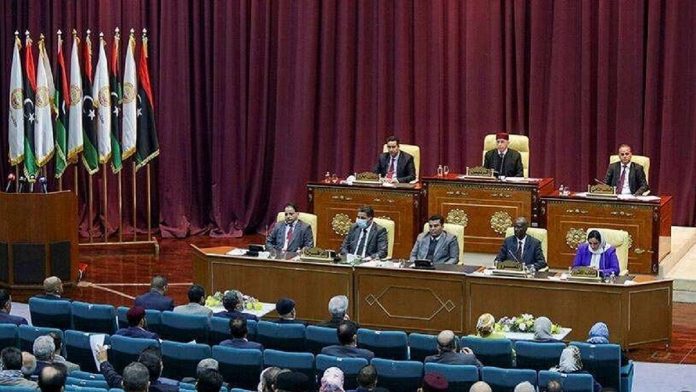Libyans demand a national reconciliation process to resolve the deep divisions that emerged after the fall of the Gaddafi regime
Soldecanarias.net / Adeje
Libya’s House of Representatives overwhelmingly approved the National Reconciliation Law during a recent session in the eastern city of Benghazi, marking crucial progress toward overcoming years of conflict and civil war.
This was confirmed by the Council’s spokesperson, Abdullah Belhaq, who explained that this approval occurred after addressing ‘the national reconciliation bill’ and after concluding the analysis and deliberation of its articles.
Parliament did not reveal the details of the articles of the law during its closed session or through an official statement. However, Libyan media reported that the law, which consists of 62 articles, was approved, except for article 44 and the following ones.
These articles, which propose the establishment of a special fund for compensation, were postponed for further study and greater consensus, in order to ensure that the requirements of justice are met and the needs of all parties involved are met.
Saleh Afhima, member of the Legislative and Constitutional Committee of the Libyan House of Representatives, confirmed that the adoption of the law was the result of hard work and long negotiations that required considerable time and effort.
In a statement to the Libyan newspaper Al-Marsad, he added that the law emerged thanks to cooperation and coordination between various parties, taking into account the observations of the actors involved, including civil society institutions, legal experts and members of the Supreme Council. of State, as well as the legal commission designated by the Presidential Council.
He explained that the conference held in Tunisia was key in the drafting of the law, as the House of Representatives Reconciliation Committee worked in collaboration with the Legislative Committee and several other actors to collect and evaluate the comments, incorporating them into the final version. of the law in a way that reflected the desire of Libyans to achieve justice and national reconciliation.
Afhima highlighted that this law constitutes a fundamental step towards the consolidation of transitional justice and the promotion of national reconciliation. Furthermore, he called on all parties to come together in a spirit of national cooperation to implement the law and achieve its objectives, in a way that benefits the future and unity of Libya.
Last November, the president of the Presidential Council, Mohamed Al-Manfi, asked the president of the House of Representatives, Aguila Saleh, to approve the national reconciliation law submitted by the Presidential Council in February of the previous year, ‘without introducing no modification, in a transparent and valid session’. This request was made in a letter addressed to the Office of the President of Parliament, dated November 20 of last year.
The Presidential Council has been working on a national reconciliation project since April 2021 and plans to organize an inclusive conference with the support of the African Union and the United Nations Support Mission in Libya. However, the conference has been postponed on several occasions due to continued disagreements between political parties over the agenda and lack of consensus among stakeholders on their positions.
Before Parliament voted on the law, Abdullah Al-Lafi, member of the Presidential Council, stated that the national reconciliation project is based on “the principle of comprehensiveness and inclusion of all parties, in order to ensure the achievement of its lofty goals.
As published on his Facebook account, Al-Lafi added that this project was sent to the House of Representatives “after its articles were carefully prepared by national experts, so that it becomes a key station on the path to the promotion of peace and stability.”
Libyans have made considerable progress in the national reconciliation process, especially after the signing of a reconciliation agreement between the Tubu ethnic group and the Arabs in the city of Murzuq, in southern Libya. This agreement ended years of fighting, sending a hopeful signal that Libyans are willing to put the past behind them and address outstanding issues.
Likewise, the House of Representatives has organized a series of conferences and meetings with experts as part of the preparations for national reconciliation, considered one of the priorities of this stage, and in preparation for the elections that have been expected for years.
The Libyan Government, emerged from the House of Representatives, is preparing to hold a conference for expatriates as part of efforts at national reconciliation and overcoming the past. This will be the first conference of its kind aimed at Libyans living abroad, after the migration of tens of thousands of people since 2011, due to the successive wars that the country has suffered.
The number of Libyans abroad is estimated to exceed 1.5 million, most of whom reside permanently in neighboring countries, especially Egypt and Tunisia, as a result of conflicts following the fall of dictator Muammar Gaddafi.
The international community, led by the United Nations Support Mission in Libya, the sponsoring countries of the Berlin Conference on Libya and the African Union, supports the implementation of national reconciliation in Libya.
In this sense, the visits of the Mauritanian president Mohamed Ould Sheikh Al-Ghazouani, president of the African Union, and Denis Sassou Nguesso, president of the Republic of Congo-Brazzaville, who headed the High Level Committee of the Union, were framed. African on Reconciliation in Libya.
Libyans demand national reconciliation to resolve the deep divisions that emerged during the protests that toppled the Gaddafi regime (1969-2011) and the internal wars that followed in recent years.
At the same time, international and local efforts continue to lead Libya to elections that will end the conflict crisis between the two opposing governments. One of them is the Government of National Unity, headed by Abdul Hamid Al-Dabaiba, based in Tripoli (west) and which administers the western region of the country. The other was appointed by the House of Representatives in early 2022, under Osama Hammad, and is based in Benghazi, from where it administers the east and most southern cities.



